
Led Zeppelin were an English rock band formed in London in 1968. The band comprised Robert Plant (vocals), Jimmy Page (guitar), John Paul Jones and John Bonham (drums). With a heavy, guitar-driven sound, Led Zeppelin drew from influences including blues and folk music, and are cited as a progenitor of hard rock and heavy metal. They significantly influenced the music industry, particularly the development of album-oriented rock (AOR) and stadium rock.

Led Zeppelin III is the third studio album by the English rock band Led Zeppelin, released on 5 October 1970. It was recorded in three locations. Much of the work was done at Headley Grange, a country house, using the Rolling Stones Mobile Studio. Additional sessions were held at Island Studios and Olympic Studios in London. As with the prior album, the band eschewed the use of guest musicians, with all music performed by band members Robert Plant (vocals), Jimmy Page (guitars), John Paul Jones, and John Bonham (drums). The range of instruments played by the band was greatly enhanced on this album, with Jones especially emerging as a talented multi-instrumentalist, playing a wide range of keyboard and stringed instruments, including various synthesizers, mandolin and double bass, in addition to his usual bass guitar. As with prior albums, Page served as producer on the album, with mixing done by Andy Johns and Terry Manning.

Physical Graffiti is the sixth studio album by the English rock band Led Zeppelin. Released as a double album on 24 February 1975 in the United States and on 28 February 1975 in the United Kingdom, it was the group's first album to be released under their new label, Swan Song Records. The band wrote and recorded eight new songs for the album in early 1974 at Headley Grange, a country house in Hampshire, which gave them ample time to improvise arrangements and experiment with recording. The total playing time covered just under three sides of an LP, so they decided to expand it into a double album by including previously unreleased tracks from the sessions for the band's earlier albums Led Zeppelin III (1970), Led Zeppelin IV (1971) and Houses of the Holy (1973). The album covered a range of styles including hard rock, progressive rock, rock 'n' roll and folk. The album was then mixed over summer 1974 and planned for an end-of-year release; however, its release was delayed because the Peter Corriston-designed die-cut album cover proved difficult to manufacture.
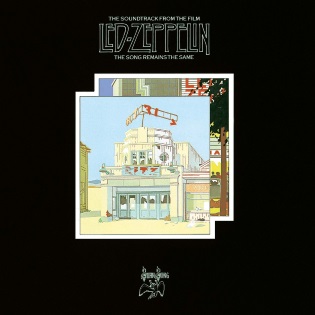
The Song Remains the Same is the live soundtrack album of the concert film of the same name by the English rock band Led Zeppelin. The soundtrack was recorded 27–29 July 1973 and released on 22 October 1976 on Swan Song Records.
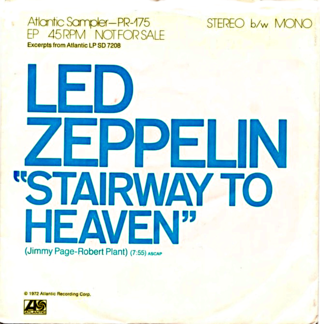
"Stairway to Heaven" is a song by the English rock band Led Zeppelin, released on 8 November 1971 on the band’s untitled fourth studio album, by Atlantic Records. Composed by the band's guitarist Jimmy Page with lyrics written by lead singer Robert Plant, it is widely regarded as one of the greatest rock songs of all time.
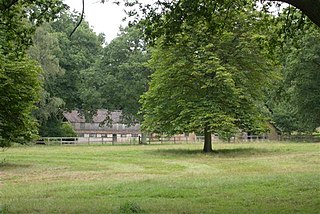
Headley Grange is a former workhouse in Headley, Hampshire, England. It is a Grade II listed historic building. It is best known for its use as a recording and rehearsal venue in the 1960s and 1970s, by acts including Led Zeppelin, Genesis, Bad Company and Help Yourself.
"The Rover" is a song by English rock band Led Zeppelin written by guitarist Jimmy Page and singer Robert Plant. Although mostly recorded years earlier, it was released on the group's 1975 double album, Physical Graffiti.
"That's the Way" is a folk rock ballad by English rock band Led Zeppelin from their third album, Led Zeppelin III, released in 1970. As with several of the tracks on the album, it is an acoustic song.
"Down by the Seaside" is a ballad by English rock band Led Zeppelin from their 1975 album Physical Graffiti.
"Tangerine" is a folk rock song by the English band Led Zeppelin. Recorded in 1970, it is included on the second, more acoustic-oriented side of Led Zeppelin III (1970). The plaintive ballad reflects on lost love and features strummed acoustic guitar rhythm with pedal steel guitar.
"Friends" is a song by English rock band Led Zeppelin. It was written by Jimmy Page and Robert Plant in 1970 at Bron-Yr-Aur, a small cottage in Wales where they stayed after completing a concert tour of the United States. The song was released on Led Zeppelin III (1970), where it appears as the second track. Biographer Stephen Davis called the piece "Jimmy's [Page's] last stab at psychedelia".
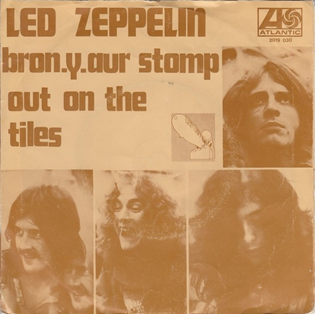
"Bron-Y-Aur Stomp" is a song recorded by English rock band Led Zeppelin for their third album, Led Zeppelin III, released in 1970.

Listen To This, Eddie is a bootleg recording of a rock concert by English band Led Zeppelin, performed on June 21, 1977, at the Los Angeles Forum in Los Angeles, California. The first concert of a six-night stint. It is often noted as one of the band's most noteworthy performances. It is also distinguished by its clear sound.

Live on Blueberry Hill is a bootleg recording of English rock group Led Zeppelin's performance at the Los Angeles Forum on September 4, 1970, which took place during their summer 1970 North American Tour.

Burn Like a Candle is a bootleg recording of the English rock group Led Zeppelin's performance at the Los Angeles Forum on June 25, 1972. It was originally released on CD format in the 1990s by the Smoking Pig label.

Earls Court 1975 were five concerts performed by the English rock band Led Zeppelin at Earls Court Arena in London in May 1975.
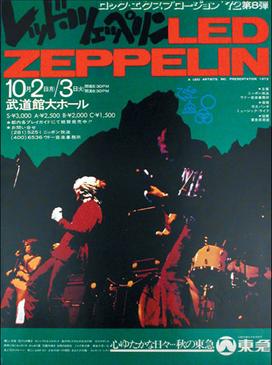
Led Zeppelin's 1972 Japanese Tour was the second and final concert tour of Japan by the English rock band. The tour commenced on 2 October and concluded on 10 October 1972.

Led Zeppelin's 1972 North American Tour was the eighth concert tour of North America by the English rock band. The tour was divided into two legs, with performances commencing on 27 May and concluding on 28 June 1972. It included two warm-up shows in Europe.

"Over the Hills and Far Away" is the third track from English rock band Led Zeppelin's 1973 album Houses of the Holy. In the US, it was released as a single, with "Dancing Days" as the B-side.
The Led Zeppelin Deluxe Edition is a series of albums reissued by English rock group Led Zeppelin, distributed by Atlantic Records. It contains all nine of the original Led Zeppelin studio albums remastered from the original analog tapes. Along with the remastered albums, there is a companion disc with each album, consisting of previously unreleased audio tracks and alternate mixes of released tracks. Many of these are described as work-in-progress or alternate mixes made during the original production rather than new remixes generated to highlight discarded recording elements. The first companion album consists of the 10 October 1969 concert in Paris. The albums were released in chronological order, each with inverted album covers.















